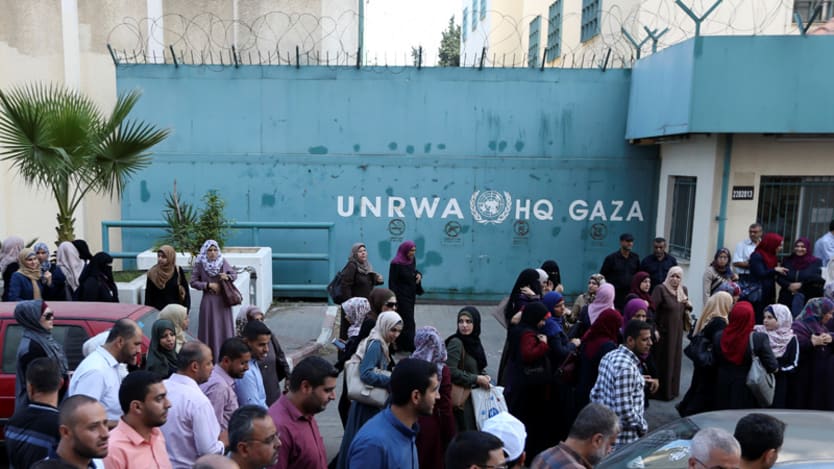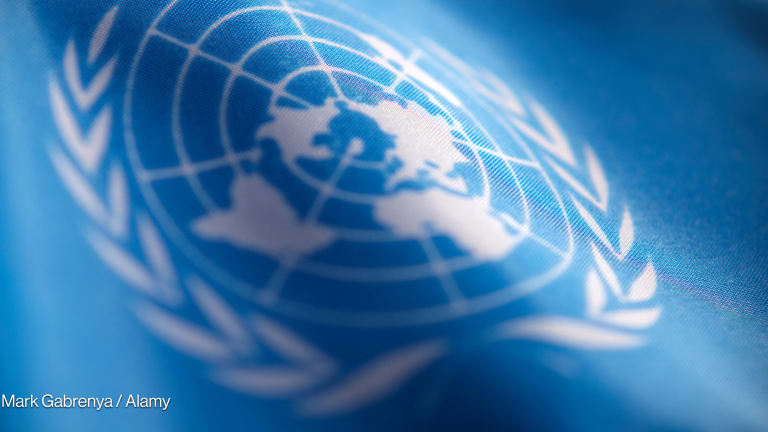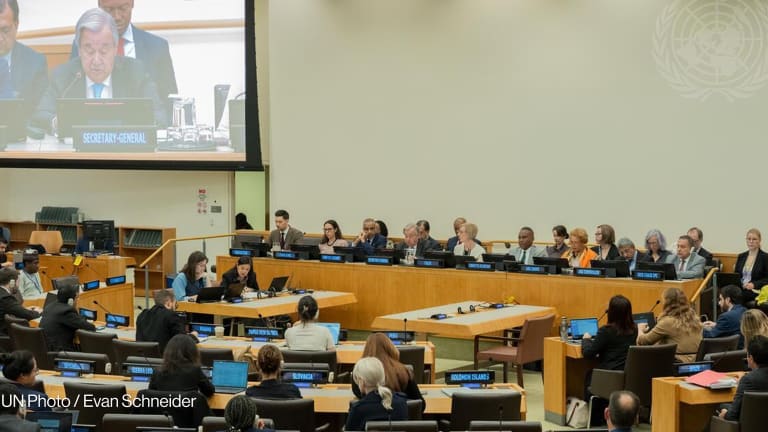UN Palestinian agency considers new approach to overcome US funding cuts

UNITED NATIONS — Amid a recurrent funding crisis, the U.N. agency for Palestinian refugees is planning a necessary new path toward sustainability.
The U.N. Relief and Works Agency for Palestine Refugees in the Near East will require a new funding model — and possibly an updated image — so it can plan beyond the looming threat of routine shortfalls, according to Peter Mulrean, director of UNRWA’s New York office.
UNRWA, which supports 5 million registered Palestinian refugees with medical, food, and education work, is hoping to secure $60 million by June to cover its aid and development work in Gaza and other regions through 2019. Without this funding, food aid for approximately 1 million Palestinians in Gaza, or more than half the territory’s population, could be in jeopardy, UNRWA announced earlier this month.
“We do not have reserves. We are looking at getting through this year and having adequate funding,” Mulrean, a former U.S. Department of State diplomat, explained to Devex in a recent interview in his office across the street from U.N. headquarters. “Based on where we stand now, in June we will start running short of funds.”
The United States cut funding to UNRWA in 2018, removing itself as the agency’s largest single country donor. At the time, the Trump administration questioned the idea of burden sharing and how a growing number of Palestinians qualified as aid recipients.
In 2017, the U.S. provided $364 million to UNRWA, funding about 30% of its operations. In 2018, that amount dropped to $60 million then to zero in 2019, according to Mulrean.
“We had a $446 million shortfall [in 2018] and managed to fill the gap and get it down to zero by the end of last year, which represented extraordinary measures by donors from Europe and the Gulf,” Mulrean said. “So the good news was, we filled this unprecedented gap. The bad news was, we had about 36 hours to celebrate it because we had to start doing it again in 2019.”
The losses would have been greater, but UNRWA found $92 million in cost savings by not hiring new staff or expanding programs last year, Mulrean explained. Their new strategy for 2019 is to work with a zero-growth budget of about $1.2 billion.
“What we have this year is a target for the donors to come through at the same level,” Mulrean said. “Our approach is now saying, ‘We know it was hard, we know you took extraordinary measures last year, but if you can do the same we did last year, we can maintain all of our major operations.’”
UNRWA, meanwhile, is looking to build other long-term donor relationships. The Islamic Development Bank and the World Bank are both in talks with UNRWA to establish trust funds. And Saudi Arabia increased its funding from $58 million in 2017 to $157 million in 2018.
“We are exploring an increase of Islamic financing at the individual and institutional level. We have campaigns going on in the month of Ramadan to try to increase those sources of funding,” Mulrean said. “This sort of an approach takes time and the results are encouraging, but that is a medium-term strategy for developing a source of funding.”
Already, though, the impact of a stagnant budget is visible across the agency’s programs for the Palestinians living in Gaza, the West Bank, Jordan, Syria, and Lebanon. Class sizes in UNRWA schools have grown, while the number of teachers has declined. Open staff positions have not been filled and the daily patient load for doctors in health clinics has increased.
Gaza’s population of 2 million has grown faster than expected over the last several years, while basic infrastructure and services have not kept pace, according to a recent U.N. report.
“Everyone says we would like to see more cost efficiencies. We have not replaced vehicles, we have not replaced computers, that sort of thing. At some point you have to make those investments,” Mulrean said.
“On the surface, you can say, ‘We have managed to maintain our operations,’ but as you scratch the surface you see the negative impact the cuts have had, some of which will not be sustainable in the long run.”
UNRWA will host its annual pledging conference at the New York U.N. headquarters on June 25. Ahead of that meeting, the agency is considering how it can be seen beyond its relief work, and outside the context of one of the most volatile political situations in the world.
“We are looking at how we present UNRWA as not just humanitarian aid. How does UNRWA contribute to the SDGs? In many cases we are talking about, how do we get on track to achieve the SDGs?”
Other organizations, for example, might be able to learn from UNRWA’s model as a direct service provider and one of the largest employers of Palestinians in Gaza and the West Bank, Mulrean said.
“Can we turn this into not an every year emergency effort, but get those funders to recognize the value of UNRWA from all of those different perspectives. It is just not about humanitarian assistance,” Mulrean said. “Are we going to be able to put ourselves on solid footing based on these approaches? We cannot give an honest answer on that at this point.”
Update, May 23, 2019: This article has been updated to clarify that UNRWA received no financial support from the U.S. in 2019.
Search for articles
Most Read
- 1
- 2
- 3
- 4
- 5








